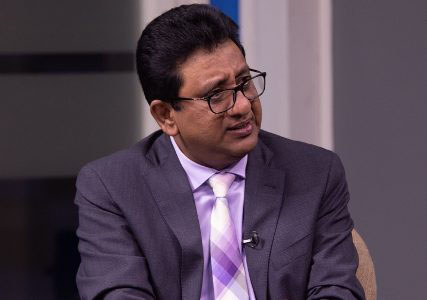Venezuela’s referendum on Guyana’s Essequibo can be interpreted as an attempt to “defeat” the purpose of the International Court of Justice (ICJ) and the litigation that is now before it seeking affirmation of the 1899 arbitral ruling as a final settlement of the boundary between the two countries.
This is according to Attorney General and Minister of Legal Affairs Anil Nandlall SC who said that the November 6th emergency sitting of the National Assembly on the Venezuelan crisis will see the government and the opposition unite on the issue.
Monday’s special parliamentary sitting is among local efforts aimed at urgently addressing the escalating tensions to counter Venezuela’s most recent claims to Guyana’s Essequibo.
On October 30th, Guyana applied to the ICJ for urgent provisional measures to counter Venezuela’s planned referendum.
Describing Venezuela’s claim as “baseless,” over what he emphasized is this country’s “sovereign territory,” Nandlall, in his weekly Facebook programme, “Issues in the News,” said it is common knowledge now that Venezuela’s government is nonetheless proceeding with its referendum.
He explained that among other things, and with total disregard for the case between the two countries which is currently pending before the ICJ, that referendum seeks in essence, a mandate from the Venezuelan electorate, to annex over two-thirds of Guyana’s territory.
Guyana’s appeal to the Holland-based ICJ—the World Court—has also seen it urging CARICOM and the international community to continue reminding Venezuela of its obligations under international law.
Caracas elevated the border controversy to new heights when it announced the December 3rd referendum leading Georgetown to charge that it was attempting to annex Essequibo despite the fact that the matter between the two countries is now before the ICJ.
Nandlall reminded that the referral of the controversy to the World Court, arose from a recommendation made by the United Nations (UN) Secretary General (SG), who is empowered to make such a recommendation by virtue of the 1966 Geneva Agreement, signed by both the governments of Guyana and Venezuela, giving the SG such powers.
“So notwithstanding the pendency of this matter in the Court, Venezuela wants to ignore the legal process, ignore the edict of the United Nations Secretary General, ignore the 1966 Geneva Agreement, ignore the 1899 Arbitral Award, ignore international law, ignore statements of condemnation coming from the UN Secretary General himself and more recently from CARICOM, from the Organization of American States (OAS) and the US Government; among others,” Nandlall said.
The AG said that “fortunately, the Government and the Opposition are united on this issue;” noting that both the Leader of the Opposition, Aubrey Norton and President Irfaan Ali have met and have had discussions.
He said it was from that meeting between the two, that it was agreed that a special sitting of the National Assembly will be held.
Nandlall said that local parliamentarians will be speaking “with one voice,” on the issue.
Additionally, he underscored that government has approached the ICJ for the interim measures being sought.
Nandlall said that while Venezuela—voluntarily or involuntarily—has submitted to the jurisdiction of the Court and is participating in the proceedings, it has decided “outside of the Court” to take steps that clearly are inimical and inconsistent with the integrity of the legal proceedings themselves.
He said that this display by Venezuela can be considered not only “disrespectful,” of the Court’s process, but can also be interpreted as attempts to “defeat” the Court’s purpose and the litigation itself.
The AG said that in these circumstances, a party must have a right to approach a Court to request some form of relief to preserve the integrity of the legal process pending before it; as he underscored the background against which Guyana has asked for the urgent provisional measures.
He added that in such a situation, a Court has a duty to take such measures and issue such orders to protect its processes from abuse.
No Court he said, will stand idly by, or ought to stand idly by while the subject matter of the litigation that is engaging its attention, is being destroyed by an external process.
The AG said that local parliamentarians will speak resolutely with one voice on the issue in the National Assembly with the hope that the developing impasse would be swiftly overcome.
Background
According to a press release from the ICJ, Guyana requested the Court to indicate the following provisional measures:
“1. Venezuela shall not proceed with the Consultative Referendum planned for
3 December 2023 in its present form;
2. In particular, Venezuela shall not include the First, Third or Fifth questions in the Consultative Referendum;
3. Nor shall Venezuela include within the ‘Consultative Referendum’ planned, or any other public referendum, any question encroaching upon the legal issues to be determined by the Court in its Judgment on the Merits, including (but not limited to):
a. the legal validity and binding effect of the 1899 Award;
b. sovereignty over the territory between the Essequibo River, and the boundary established by the 1899 Award and the 1905 Agreement; and
c. the purported creation of the State of ‘Guayana Esequiba’ and any associated measures, including the granting of Venezuelan citizenship and national identity cards.
4. Venezuela shall not take any actions that are intended to prepare or allow the exercise of sovereignty or de facto control over any territory that was awarded to British Guiana in the 1899 Arbitral Award.
5. Venezuela shall refrain from any action which might aggravate or extend the dispute before the Court or make it more difficult to resolve.”




